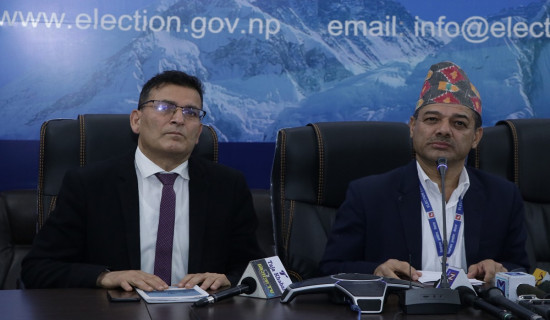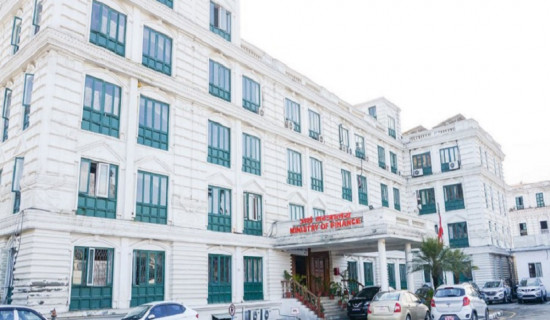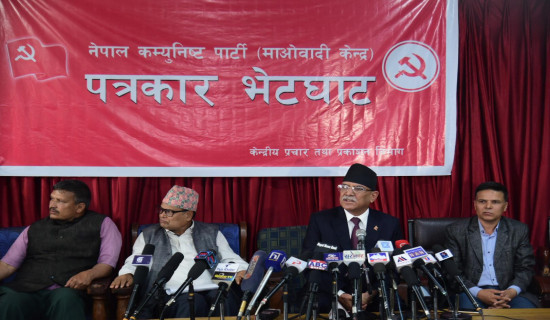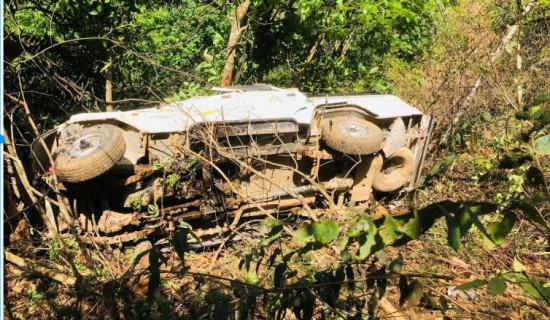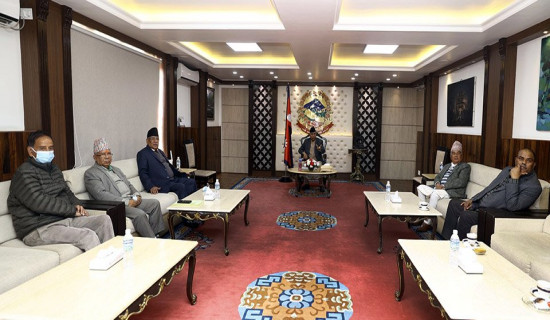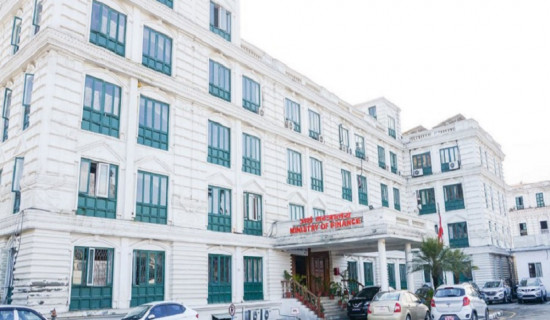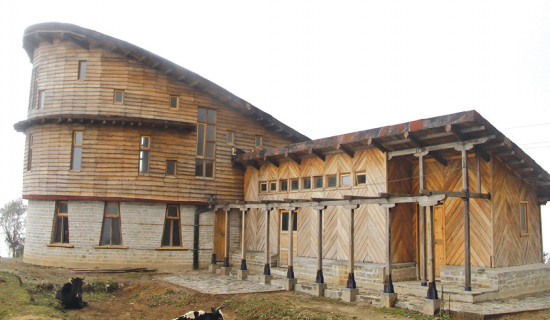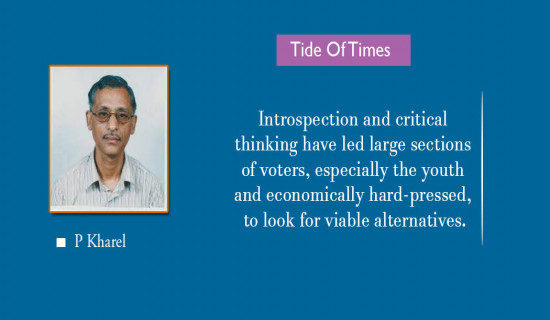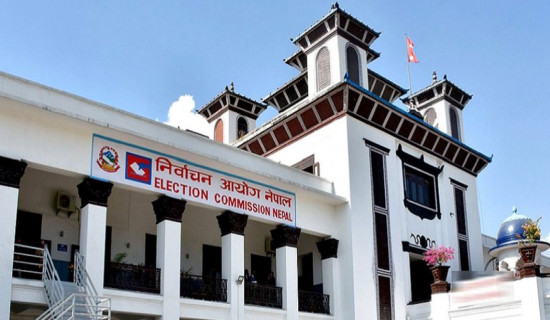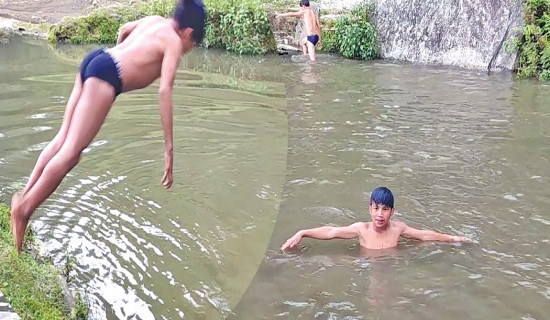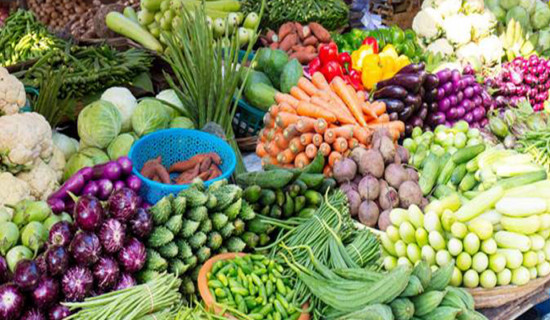- Monday, 29 September 2025
Seventh agriculture census beginning tomorrow
The seventh agriculture census is taking place from tomorrow (Tuesday). For the census that takes place every 10 years, 5,200 enumerators and 1,300 supervisors have been deployed.
EC prints required ballot papers for 46 districts
The Election Commission has completed the print of required ballot papers for 46 districts.
Fuel allowance to Govt. officials reduced by 20%
The decision has been taken in the wake of an increasing trade deficit, decreasing rate of remittance inflow and pressure on the foreign reserve.
Agreement on metropolis, sub-metropolis likely by this evening: Chair Prachanda
"We are making efforts to forge an understanding among the ruling coalition for all six metropolitan cities and 11 sub-metropolitan cities. Agreement on the metropolitan city has reached a conclusion point," said Chairman Prachanda, adding, " I hope we will reach a conclusion on electoral alliance for metropolis and sub-metropolis among the ruling parties by this evening."
Coalition parties agree to conclude seat allocation in metropolis, sub metropolis today itself
Kathmandu, Apr. 18 (RSS): The coalition partners in the incumbent government have today discussed seat allocations in metropolitan and sub-metropolitan cities across the country for the May 13 local election.In the meeting of the local level election preparation, mobilization and monitoring committee, they also agreed to sit down again and conclude the seat allocation later today itself, according to advocate Keshab Raj Joshi, legal expert to Prime Minister Sher Bahadur Deuba and the committee member secretary. The meeting focused on the seat allocations in basically six metropolitan and 11 sub-metropolitan cities across the country, he said. The meeting coordinated by PM Deuba, also President of Nepali Congress, that took place today morning at the official residence of Prime Minister at Baluwatar, was attended by top leaders of coalition parties—CPN (Maoist Center), CPN (Unified Socialist), Janata Samajwadi Party Nepal and Rastriya Janamorcha.
Death toll in Syangja jeep plunge reaches six
Waling, April 18 (RSS): The death toll in Syangja jeep accident has reached six. The latest victim of the accident is a 50-year-old Ganga Bahadur Dala of Waling-12 who died today morning at Gandaki Medical College in Pokhara, said Padam Raj Thapa, Spokesperson at District Police Office. The other five injured in the accident are receiving treatment at the hospital, he said. A jeep (Ga 1 Ja 7399) heading to Bayantari from Waling Municipality-12 skidded off the road and fell around 200 meters at Phirphire on Sunday morning, killing six including Dala and injuring five, said the police.
Meeting to resume on Monday evening after internal discussions in parties
The meeting of the ruling coalition has been postponed to Monday evening.
Discussions underway to decide common candidates from coalition
The meeting of the ruling coalition is underway in Baluwatar. Chairman of the CPN (Maoist Centre) Pushpa Kamal Dahal 'Prachanda's press coordinator Surya Kiran informed that the meeting of the ruling coalition has been going on since 10:15 am.
Govt. decides to reduce fuel for government facilities by 20 per cent
The finance ministry has decided to reduce the government fuel facility by 20 per cent.
Red Panda Study Centre established
By Chandra PandakTaplejung, Apr 18 : A Red Panda Study and Research Centre has been set up at Deurali near Suketar, a tourist area of Taplejung.The district-based Himalayan Conservation Forum and the Red Panda Network have built the Red Panda Study and Research Centre at Deurali Community Forest in Handewa, Phungling Municipality-9. The centre has been set up to study and research biodiversity and wildlife, said Ramesh Rai, programme coordinator of the Himalayan Conservation Forum. According to Rai, structures including buildings have been constructed at a total cost of Rs. 1.57 million. Rai informed that the physical infrastructure has been constructed with the financial support of Red Panda Network and the facilitation of the forum. Organic construction materials have been used for the construction as it is an environmentally-friendly structure, he said.According to Amrit Bhattarai, project supervisor of construction company SNP, environment-friendly raw materials and locally produced materials have been used in the construction of the structure.Bhattarai said that a mixture of dung, ash, eggshell, pure mustard oil, lime, clay and straw was used in the construction of the resource centre. He said that these materials will make the structure environment-friendly as well as strong, durable and weather-friendly. At present, the construction work of the building is about 99 per cent complete and it is said that it will be operational soon.It is believed that the establishment of the centre will help in the conservation of forests and rare wildlife, said Nimakriya Sherpa, chairperson of Deurali Inner Community Forest Users Group.Sherpa said that the centre has been set up with the objective of increasing the income of the consumer group by conserving local biodiversity, promoting environment-friendly services, and utilizing tourism with good use. He said that there is also a plan to develop it as an exhibition centre for the protected species including rare red panda and herbs.
DIG Aryal recommended for promotion
The Home Ministry has recommended Deputy Inspector General of APF, Raju Aryal, for the promotion to the post of Additional Inspector General.
Fright From The Right
P Kharel, Personalized politics and petulant attitude sharply shrunk the popularity meter of France’s President Emmanuel Macron as quickly as he rose to the seat of power in 2017. However, the first-round presidential election last week on April 10 left him almost high and dry in that Marine Le Pen gave him the shake-up neither he nor his close supporters had expected. Macron’s reelection bid triggered nail-biting suspense until the last minute. British Prime Minister Boris Johnson might have savored a personal satisfaction of the French leader’s setback, though not all is lost yet, given the petty politics Macron,45, unrolled against the United Kingdom’s trade interests following Britain’s formal pullout from the European Union membership. That is how voter verdicts build up. National Rally party leader Le Pen closed in on Macron’s margin of lead in the opinion polls day by day in the closing fortnight. Reality dawned on Macron as to how far he had lost large voter support because of his arrogant style. He made noises about vainly trying to become a self-appointed peacemaker to the Ukraine crisis. Moscow did not trust him, as it concluded he would side with the US-led herd when the crunch came. Macron’s career at the summit of French power began when he was nearing 40 years in May 2017 and entered the 500-year-old Elysee Place which serves as the residence-cum-office for the country’s executive president. He had secured 66.1 percent of the votes in the second round but with support from candidates that lost the first round and did not want Le Pen to win. Whereas France was seen as supporting some of its other European cousins that advocated identity politics at the micro-level far and wide, the same has begun to bug French politics now, much to the consternation of the country’s self-declared liberals. The May presidential elections have shown that the status quo in the existing equation in outlook is changing in France and elsewhere. The trend is likely to gain ground in the coming times, as growing dissatisfaction marks electoral politics.Economic equality and disguised forms of discriminatory practices have made people fed up with the existing conditions. Derided by the political elite who bask in the status quo that turns the wheels of their profit-making machines and acknowledges their resultant station in society, the term populism is downplayed regarding its growing adherents and overplayed as a weapon of “destabilization”. Le Pen’s surge in political stock has unnerved the hardliners among the status quoits. She has become a symbol of populism, as defined by her critics. The first round established her firm and solid as a force to reckon with rather than a temporary phenomenon destined to peter out in the not far future. Reality speaksPublic opinion polls consistently give Russian President Vladimir Putin approval ratings of more than 70 percent — something most of his counterparts in Western democracies do not maintain even in their first few years in office. Russians, in general, see Putin as a man who restored law and order, stabilized the economy, and restored Russian pride as a force to reckon with. In France, voter abstention plays a crucial role. Should supporters of the leftist group decide not to show up in the run-off slated for next Sunday, Le Pen’s prospects for the presidency will soar. Her father Jean-Marie Le Pen entered the second round in 2002 but rival parties combined to vote against him just as the daughter, too, faced a similar situation in 2017. The recent voting trend shows that French youth do not feel as duty-bound to cast their ballot as the older generations have done after World War II. This gives the anti-Le Len sections the jitters. In previous instances, the left groups supported the leading candidate to prevent the far-right candidate from victory. In the recent first-round polls, Macron obtained a little less than 28 percent of the votes cast against Le Pen’s 23 percent-plus and the far-left Jean-Luc Melenchon’s 22 percent. Now that he is out of the race, Melenchon has made an appeal to his supporters to vote for the incumbent president. Former President Nicolas Sarkozy, who was found involved in a “corruption pact” of bribery and influence peddling, has pledged to support Macron in exchange of a promise to have him appointed as the next prime minister. This all carries political baggage that could erode the credibility of parties engaged in traditional politics. More to the rightMeantime, Hungary’s President Viktor Orban won a landslide majority of voters for the fourth consecutive time. The traditional European powers groaned under the weight of the outcome they deeply hated and moaned over such tendencies in other locations as well. Introspection and critical thinking have led large sections of voters, especially the youth and economically hard-pressed, to look for viable alternatives. Having faced severe shortages and galloping inflation in the initial years after the 1991 disintegration of the Soviet Union, the Russian people underwent highly trying times. When Vladimir Putin became president in December 1999 to complete the remaining year of Yeltsin’s term, he swung into the action of robust campaigning. He not only obtained a fresh full term in office on his own but has wielded power ever since. These are times, when new world order is emerging, whose early signs have started unfolding. Its course, shape, and outcome will determine social and national outlook, international and economic ties, and power equations. The traditionally privileged will dig their heels deep to keep their positions from sliding whereas the new forces will not let down their ambitions for a larger say and share in setting agendas.(Professor Kharel specializes in political communication.)
JEOC to be established to conduct elections in effective way
A joint election operation centre (JEOC) is to be established at the Election Commission on April 23 under the coordination of the EC.
Think deep to curb drowning
By Nayak PaudelKathmandu, Apr 18 : Ranjan Shrestha, a 22-year-old permanent resident of Dolakha, and his friends had gone to Ward No. 9 of Chautara Sangachowkgadi Rural Municipality of Sindhupalchowk district from Kathmandu for recreation.On Saturday afternoon, the group had gone to the Sunkoshi River for swimming. However, during the recreation, Shrestha went missing in the river.“Shrestha dived too deep and went missing. He was later found dead,” said Deputy Superintendent of Police (DSP) Dakshya Kumar Basnet.DSP Basnet, who is also the spokesperson for District Police Office, Sindhupalchowk, added, “There were around seven of them in total. Three of the friends were outside the river when the incident happened. It was already late when professionals had reached the scene for rescue.”According to DSP Basnet, the group had gone to a secluded place due to which they couldn’t receive help at the earliest.The daily news bulletins of the Nepal Police Headquarters show that 16 individuals, including seven children, have died of drowning across the country in the past two weeks from April 3 to April 16. “We have reviewed the cases of drowning incidents in Nepal with the help of Nepal Police data and it is worrying,” said Dr. Dijan Bhattarai, spokesperson for the National Disaster Risk Reduction and Management Authority (NDRRMA).More than 500 cases of drowning are likely been recorded across Nepal annually in recent years.As the days are hot, people, mostly from Terai, visit water bodies nearby or far for swimming. However, lack of knowledge about the respective water mass and inability to swim well has been leading to deaths.“Mostly children are in risk of drowning and the major reason is lack of proper surveillance by the family members. Children drown in small sources of water due to which they need to be monitored well,” said Bhattarai.Dev Raj Yadav, an eight-year-old of the Saptari district, was seriously injured after he got drowned while swimming at a local pond on April 10. He died while being rushed to the hospital.Kanchan Gole, a five-year-old of Sindhuli district, also died of drowning on April 10. She drowned while swimming at Bagmati River in Ward No. 1 of Chandrapur Municipality of Rautahat district. According to the World Health Organisation (WHO), there are an estimated 236,000 annual drowning deaths worldwide. It also states that the highest drowning rates are among children aged 1–4 years, followed by children aged 5–9 years.“Local-level governments have a major role alongside the parents to prevent drowning incidents among children. However, seeing many adults drowned it can be said that there is a lack of awareness among people of all the age groups,” said Bhattarai, who is also a government under-secretary. Other than the local level’s responsibility, officials argued that there were no initiatives from the provincial and federal levels.Meanwhile, drowning prevention had received less priority not only in Nepal but on a global scale.It was only in April 2021 that the UN General Assembly decided to celebrate July 25 of every year as “World Drowning Prevention Day” with the motto “Anyone can drown, no one should”.“We have also been aware of the losses by drowning. We are coming up with new plans and policies to prevent drowning incidents through coordination with UNICEF,” said Bhattarai.Experts stress that teaching school-age children basic swimming, water safety, and safe rescue skills can be a proper approach to preventing drowning. The WHO suggests that installing barriers controlling access to water, providing safe places away from water, training bystanders in safe rescue and resuscitation, setting and enforcing safe boating, shipping and ferry regulations, and improving flood risk management can also prevent drowning.
Price of vegetables soars in Kanchanpur
Kanchanpur, April 18: Inflation of vegetables has increased in Kanchanpur district due to the lack of availability of vegetables in markets following a decline in local production in the recent period. Production of vegetables has declined due to sudden changes in weather. Former Chairperson of Kanchanpur Vegetable Entrepreneurs' Association, Tarka Raj Bhatta, said that though the local productions—pumpkin, brinjal, bottle gourd are in the market, other vegetables are being imported from the Indian market. Vegetables like onion, potato, long bean, tomato, okra, and carrot are being imported regularly from India. Bhatta said tomatoes cultivated by farmers got damaged due to sudden changes in weather and the supply of local productions was low as compared to previous years. Sample test of the vegetables imported from India via the Gaddachauki checkpoint is carried out at a lab located at a vegetable market, Attariya, of Kailali. Tomato cultivated by Khyaliram Barma on around 15 kattas of land at Bhimdutta municipality-19 has been completely damaged due to rain and excessive cold. He had planted tomatoes in the month of November. Barma, who is involved in vegetable farming for the past 13 years, said that the price of tomatoes and lemon has skyrocketed. Though the price of bottled gourd and pumpkin has become cheaper, the price of other vegetables is high, said, businessmen. A vegetable businessman, Anil Prasad Chaudhary, said that they are now compelled to sell a piece of lemon at Rs 20 after the price of lemon reached Rs 500 per kg. Although the supply of vegetables produced in the district is low, there is no lack of vegetables in the market.



